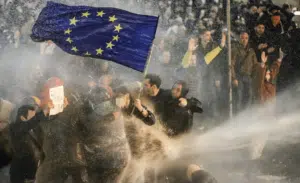Brussels – It is an open clash now between the European Union institutions and Georgia—or rather, the ruling Georgian Dream party—because, despite a month and a half of daily protests in the streets of Tbilisi and clear warnings from Brussels about the consequences of adopting a far more than a controversial piece of draft legislation, the Georgian Parliament accelerated the pace and passed the pro-Russian-inspired draft on “transparency of foreign influence” in third reading today (May 14), now putting Georgia’s already bumpy road to EU membership at very high risk.

“Tbilisi, we hear you! We see you! Georgians in the streets are dreaming of Europe. Proudly wave the European flag. They want a European future. They expect European values and standards,” commented with a post on X the Chairwoman of the European Parliament, Roberta Metsola, in a provocative response to the Georgian Parliament’s vote that gave the final go-ahead to a law that sets itself on a collision course with the values and principles required to join the Union. While 84 MPs (out of 116 in attendance) voted in favour of the law on “transparency of foreign influence,” new oceanic demonstrations were staged on the streets of the capital and on Rustaveli Avenue (where the Parliament is based) pro-EU and against a legislative initiative that is seen as Russian-inspired. And as already demonstrated in recent weeks, riot police used violence against protesters again today, according to numerous videos posted on social media by the protesters themselves.
The law on “transparency of foreign influence” was already presented last year by Georgian Dream and stalled after an oceanic wave of protests on March 2023. With a slight amendment to the text in early April, the law has been resubmitted by the government: all organisations receiving more than 20 per cent of their funding from abroad would have to register as an “organisation pursuing the interests of a foreign power” (similar to “agent of foreign influence” in effect in Russia since December 1, 2022). For weeks, tensions have been high inside and outside the Tbilisi Parliament, and last Saturday (May 11), tens of thousands of citizens gave rise to the largest wave of protests since independence from the Soviet Union in 1991). The draft law will be sent to the President of the Republic, Salomé Nino Zourabichvili, who has already announced that she will veto it, but Georgian Dream will be able to use its overwhelming majority in Parliament to override the veto and make the “transparency of foreign influence” become law.

Despite the Candidate Country status received on December 14, 2023, from the European Council in Brussels, for weeks, it is no longer a secret that the entry into force of the pro-Russian-inspired law would prevent the opening of EU accession negotiations. But now, a sharp response toward Tbilisi is being prepared in Brussels so as not to gloss over a totally unconstructive attitude on the part of the Georgian Dream-controlled government and parliamentary majority. The path to EU membership is also conditioned by progress on the European Commission recommendations on civil society freedom and combating disinformation.
From the European Parliament has come the request of the EPP, S&D, Greens, and Renew Europe MEPs to the EU High Representative for Foreign Affairs and Security Policy, Josep Borrell, to prepare targeted sanctions against all those responsible for the bill, including the Georgian Prime Minister, Irakli Kobakhidze, and the founder of Georgian Dream, oligarch Bidzina Ivanishvili. Foreign ministers from 11 member countries also urged Borrell to “send an unequivocal message to Tbilisi that this legislation is incompatible with Georgia’s progress on its path to the EU.” It is, however, in the EU Council that the attempts to work jointly among the twenty-seven countries are stalling: as early as last night (May 13), representatives of the 27 EU governments set to work on a joint statement of condemnation, but Hungary and Slovakia opposed. While work continues to dampen the intransigence of Budapest and Bratislava, a statement from the EU high representative (which requires no unanimity) is more likely expected in Brussels.
The complex relationship between the EU and Georgia
Despite being granted candidate status for EU membership, the relationship between Brussels and Tbilisi remains particularly complex due to the disconnect between an overwhelmingly pro-EU population and a government of pro-Russian tendencies, the same one that applied to join the Union due to fears raised by Kremlin expansionism. Over the past two years, there have been several episodes that have highlighted the ambiguity of the ruling Georgian Dream party: in May 2023, flights between Georgia and Russia resumed after Moscow decided to lift the current ban, and the Caucasian country never aligned with the restrictive measures introduced by Brussels against the Kremlin after it invaded Ukraine. Last fall, the government also attempted to put under impeachment (failed) the President of the Republic Zourabichvili for a series of trips to the European Union that allegedly violated the powers of the head of state according to the national Constitution.

However, the Georgian population has shown for years that it does not share the direction taken by the Georgian Dream, and this is one reason why the elections for parliamentary renewal on October 26 will be crucial. Straddling Brussels’ decision in June 2022 not to grant Georgia candidate status for the time being, two major pro-EU demonstrations took place in Tbilisi: a “March for Europe” to reiterate the people’s alignment with the values of the Union and a street call for government resignation (with no follow-up by the then Garibashvili-led executive). The common features highlighted from these demonstrations are the flags—white and red of the five crosses (national) and with the twelve stars on a blue field (of the EU)—placards with pro-European claims and the Georgian anthem interspersed with the Ode to Joy. A year later, harsh widespread protests broke out in March 2023—supported by Brussels—which led to the momentary shelving of the controversial bill on “transparency of foreign influence” until it was passed this spring in the midst of a new wave of popular protests.
In this scenario, one should not forget Georgia’s particularly sensitive relationship with Russia, a country with which it borders to the north. Its candidacy for EU and NATO membership—enshrined in its national Constitution—has long been a cause of tension with the Kremlin. After conflicts in the 1990s with the two separatist regions of South Ossetia (1991-1992) and Abkhazia (1991-1993) following Georgia’s 1991 independence from the Soviet Union, on the ground, the situation was effectively frozen for 15 years, with troops of the newly formed Russian Federation defending the secessionists within the claimed territory. The attempt to reassert Tbilisi’s control over the two regions in the summer of 2008—wanted by then-President Mikheil Saakashvili—led to a violent Russian reaction on August 7, not only in repelling the Georgian army’s offensive but also leading to the invasion of the rest of the national territory with tanks and air raids for five days. Since then, Vladimir Putin‘s Russia has recognised the independence of Abkhazia and South Ossetia and has deployed thousands of soldiers to the two territories to increase its sphere of influence in the Ciscaucasia region, in violation of the August 12, 2008 agreements.
English version by the Translation Service of Withub









